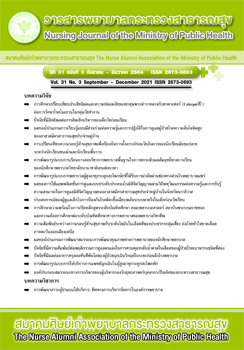A Development of Learning Model for Basic Nursing Course in Enhancing the Academic Achievement of Nursing Students at Saint Theresa International College
Main Article Content
Abstract
This action research aimed to develop a pedagogical model for the undergraduate nursing course called STIC to improve the academic performance of nursing students at Saint Theresa International College. A classroom action research design was used. The research process consisted of four basic criteria including plan, act, observe, and reflect. The subjects were 97 first-year nursing students at Saint Theresa International College in the academic year 2019. Data were collected using questionnaires and assessment instruments developed by the researchers. The results showed that 1) the mean score on the academic achievement of the Fundamental nursing course after applying the STIC model was significantly higher than that of before applying the STIC model at .01. the mean scores on satisfaction and happiness in learning of the nursing students were at a high level, and 2) the STIC model, a learning model for the Fundamental Nursing course, consisted of 4 components, namely situation, reflective thinking, inquiry method, and cooperative learning. Therefore, the STIC model can improve the academic performance of nursing students.
Article Details
บทความและรายงานวิจัยในวารสารพยาบาลกระทรวงสาธารณสุข เป็นความคิดเห็นของ ผู้เขียน มิใช่ของคณะผู้จัดทำ และมิใช่ความรับผิดชอบของสมาคมศิษย์เก่าพยาบาลกระทรวงสาธารณสุข ซึ่งสามารถนำไปอ้างอิงได้
References
2. Wangpanich P. Learning evaluation. Bangkok: Rung Ruang printing;2010.(in Thai).
3. Student Registration Department. Summary of performance according to indicators in the seminar summarizing of the performance according to the indicators, Nakhon Nayok: St.Theresa International College;2019.(in Thai).
4. Bhakdisirivichai V, Chamnansua P, Katenil K, Phromsoonthorn S. Factor predicting academic achievement of nursing students at Saint Theresa International College. Journal of Prachomklao College of Nursing, Phetchaburi Province 2020;3:146-57.(in Thai).
5. Rassamee S, Udomkrit S, Viparat Y, Kannika K. Active learning management in the era of Thailand 4.0. Journal of Educational Administration, Silpakorn University 2018;9(2):331-43.(in Thai).
6. Khaemmanee T. Pedagogy: knowledge for effective learning process. edition 7. Bangkok: Chulalongkorn University press;2013.(in Thai).
7. Sataporn P. Quality of students derived from active learning. Journal of Educational Administration Burapa University 2012;6(2):1-13.(in Thai).
8. Lersthavorntham K, Kitnopkiet K, Sawangwattanasait O. Factor influencing learning achievement of nursing students in bachelor of nursing science curriculum, Boromarajonni College of Nursing Ratchaburi. Journal of Nursing and Education 2014;7(4):13-24.(in Thai).
9. Pumtha-it T, Witoonmetha M. Effect of reflection technique to attitude, confidence and achievement of fundamental of nursing practicum. Journal of Rangsit University: Teaching and Learning 2018;12:144-54.(in Thai).
10. Chaisa P, Janwijit S. The effects of reflective thinking skill promoting based learning and instruction on reflective thinking behaviors among nursing students. Journal of Education Studies 2020;48(1):224-38.(in Thai).
11. Sirisupluxana P. Teaching nursing students to develop clinical thinking skill. The Journal of Boromarajonani College of Nursing, Nakhonratchasima 2013;19:5-19.(in Thai).
12. Kwanyuen R, Niputhutapong S. Effectiveness of group process learning in the subject of fundamentals of Nursing,Suan Dusit Rajabhat University.Faculty of Nursing.Bangkok;2015.(in Thai).
13. Nantasenee S, Wongwisesku S, Sukcharoen P, Techangkul L. Development of learning and teaching process for nursing students at Suandusit University. Boromarajonani College of Nursing, Uttaradit Journal 2018;10(2):166-79.(in Thai).
14. Waichompu N, Jorajit S. The 21st century’s challenges of nursing instructors: teach less, learn more. Princess of Narativas University Journal of Humility and Social Science 2016;3(2):73-81.(in Thai). 15. Rattanawimol C, Kaewurai W, Hingkanont P. The instructional model development focusing on standardized patient with circle of trust to enhance learning happiness for nursing student. Journal of Nursing and Health Science 2015;9(3):179-92.(in Thai).
16. Onsri P. The development of an instructional model for enhancing brain-based learning among nursing students of the Royal Thai Army Nursing College, Royal Thai Army Medical Journal 2012;65(4):249-58.(in Thai).
17. Onsri P. An instructional model for enhancing 21st-century learning skills among army nursing students. Journal of the Royal Thai Army Nurses 2018;19(3):147-56.(in Thai).
18. Wudhiwong K, Hemavibool D, Manmalai S. Learning achievements among nursing students through active learning. Journal of Nurses Association of Thailand Northern Office 2018;24(2):12-24.(in Thai).
19. Kemmis S, McTaggart R. The action research planner. Geelong: Deakin University Press;1990.
20. Thongsom P. The development of indicators of happiness in learning of students in nursing science undergraduate program under The Ministry of Public Health. Journal of Nursing and Education 2011;4(1):88-111.(in Thai).
21. Jiraro P. Principles of education research 9th ed. Burapha University. Faculty of Education. Department of Research and Applied Psychology. Chonburi;2018.(in Thai).
22. Pantaewan P. Development of students in the 21st century with active learning in nursing profession. Journal of The Royal Thai Army Nurses 2016;17(3):17-24.(in Thai).

